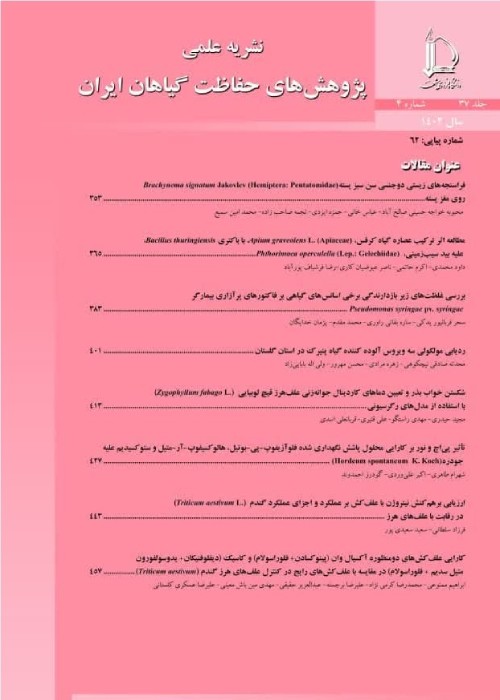Effects of Essential Oil of some Medicinal Plants on Seed Germination and Seedling Growth of Lettuce as an Indicator
Nowadays, the global effort in modern agriculture is to reduce the use of harmful herbicides and introduce new methods of weed control, one of which is the use of allelopathic properties. Among allelopathic species, aromatic plants have the ability to transmit allelochemical constituents as essential oils through diffusion and thus affect their surrounding organisms. Since the use of essential oils and volatile compounds will not have residues on the crop, these allelopathic compounds can be very effective in preventing weed growth before and after crop cultivation. Studies have shown that some essential oils or their components effectively reduce plant growth. This study was aimed to identify novel allelopathic species and their inhibitory compounds.
Plant samples consisting of 112 different plant organs including root, rhizome, corm, stem, leaf, flower, fruit, fruit peel, aerial part, and plant exudate such as oleogum belonging to 97 aromatic species from 16 different plant families were collected from different areas of Iran. The essential oils were extracted by water distillation using Clevenger. The oils were then dehydrated in glass containers with anhydrous sodium sulfate and stored at 4 °C during the experiment. The study was conducted in two separate experiments on germination and seedling growth, and lettuce was used as the test plant. The effect of 112 essential oils at two concentrations of 1 and 3 μL was investigated. The factorial experiments were conducted in completely randomized design with four replicates. Allelopathic effects of volatile compounds were evaluated by cotton swab method. The traits related to germination including Germination percentage (G%), Mean Germination Time (MGT), percentage of seed Dormancy induction (D%), percentage of embryo death as Lethal effect (L%), and seedling growth traits consist of Hypocotyl (H), Radicle (R), and Vigor Index (VI) were studied. The components of the strongest allelopathic essential oils were analyzed by headspace gas chromatography and mass spectrometry.
The results showed significant inhibitory effects of essential oils even on 1 µl concentration on the studied traits. The essential oils of Pelargonium graveolens, Pimpinella anisum and Thymus daenensis had the greatest inhibitory effect on G% (100% inhibitory); and the essential oils of Amomum subulatum, Atremisia sieberi, Dracocephalum moldavica and Thymus transcaspicus had the highest effect on MGT (more than 224%). The essential oils of Ziziphora tenuior, Pimpinella anisum, and Pelargonium graveolens caused the highest seed dormancy (more than 22%). The essential oil of Pimpinella anisum and Thymus daenensis caused the highest percentage of embryo death (100% lethality). According to seedling growth, the essential oils of Pimpinella anisum, Origanum vulgare, Perovskia abrotanoides and Thymus daenensis resulted in the highest inhibition of hypocotyl (more than 92%). Thymus daenensis and Origanum vulgare essential oil exhibited the greatest effect on decreasing radicle growth (more than 97%). Overall, the essential oils of Anise, Oregano, Russian Sage and “Denaee” Thyme were the most inhibitors of seedling growth. Finally, with respect to germination and seedling growth percentages, 25 essential oils mainly from the Lamiaceae family (12 essential oils), and some other families e.g. Asteraceae (4 essential oils), Apiaceae (3 essential oils), Rutaceae and Geraniaceae (2 essential oil), Liliaceae and Zingiberaceae (1 essential oil) had the greatest inhibitory effect on the Vigor index. According to the results of the headspace gas chromatography, compounds such as borneol, eucalyptol, limonene, alpha and beta-pinene, carvacrol, and camphene were the dominant compounds in essential oils with severe inhibitory effects. Other studies have also reported phytotoxic, antibacterial, antifungal, and pesticidal effects of some of these compounds, scant literature is, however, available on the allelopathic effects of some other ones.
Our results showed that the essential oils of medicinal and aromatic species were highly toxic to lettuce. In addition to inhibition of germination percentage and seedling growth, traits such as seed dormancy induction, embryo death and delayed germination were also affected by essential oils. In allelopathic researches, such traits are often overlooked, while they can play an important role in growth inhibition and are valuable traits for weed control. Further research is needed to identify the compounds responsible for allelopathic activity in these plants essential oils and to understand the biological roles of these compounds in natural ecosystems. Such information could provide a broader perspective for researchers on the production of new bioactive chemicals from natural products. Identification of allelopathic plants and compounds, and their biological functions are important for the biological control of weeds in organic agriculture as well as species that can adversely affect forestry projects.
- حق عضویت دریافتی صرف حمایت از نشریات عضو و نگهداری، تکمیل و توسعه مگیران میشود.
- پرداخت حق اشتراک و دانلود مقالات اجازه بازنشر آن در سایر رسانههای چاپی و دیجیتال را به کاربر نمیدهد.


